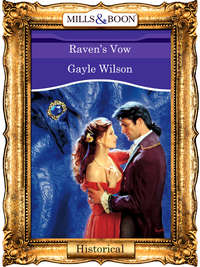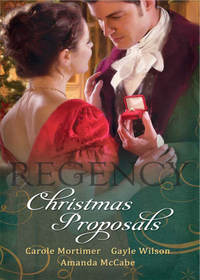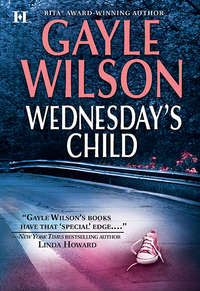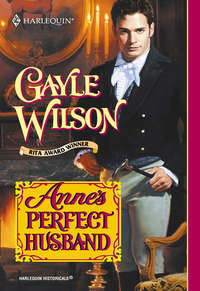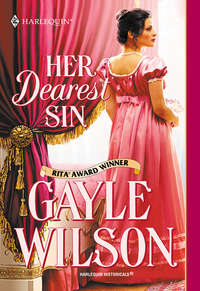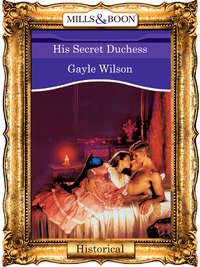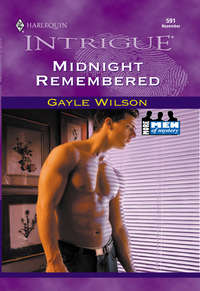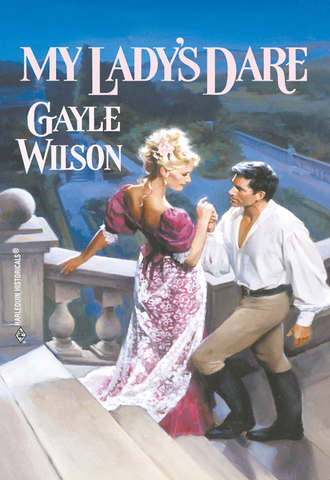
Полная версия
My Lady's Dare
As she bent over him, however, the earl was suddenly surrounded by the subtle scent she wore. Not the familiar rose or lavender waters favored by the women of his set. This was something darker, heady with musk, sensually evocative, and almost certainly French.
When the woman straightened and began to turn to put the decanter back on the tray, Dare spoke, his accent deliberately no better than the average Englishman’s, although he had been fluent in French since childhood. “Merci, mademoiselle.”
“But Mrs. Carstairs is a countrywoman of yours, my lord,” Bonnet corrected, his tone verging on amusement.
“Indeed,” Dare said, pretending to study her features as if her nationality might somehow be revealed by them. “I’m sure I should never have guessed. My compliments, madam.”
At his words, she turned back, the decanter still in her hands. From the look in her eyes, the earl could not be perfectly certain she wasn’t about to throw it at his head.
“Your…compliments, my lord?” she asked.
“For being English, of course,” the earl said, his lips tilting. “Why, whatever did you think I meant, Mrs. Carstairs?”
“I thought you were complimenting me that I didn’t appear to be English.” Her eyes challenged him a moment before she added, her tone conciliatory, as befitted someone in her position. “Obviously, I was mistaken. Pray forgive me, my lord.”
“Had I meant that, madam,” Dare said smoothly, “then I should be the one to beg your forgiveness.”
“There is no need for your apologies here, Lord Dare,” Bonnet said laughing. “Whatever your meaning. Elizabeth is here to serve you. If there is anything you should require during your visit, anything at all…” The Frenchman paused and again gestured expansively, this time seeming to include the woman and the servant behind her, who was still holding the tray. “Please don’t hesitate to make your wishes known. Any of my servants will be pleased to accommodate so welcome a guest. In any way you desire,” he added, his voice soft, and his eyes on the woman.
There had been an obvious undercurrent in the suggestive words, and Dare found himself interested in Elizabeth Carstairs’ reaction. Her eyes met Bonnet’s. Dare was unable to see what was in them, but there was no doubt about the rush of color that ran beneath the translucent skin of her throat and spread upward into her cheeks, far more pronounced than the rouge.
The intent of Bonnet’s offer had probably been clear to everyone. Mrs. Carstairs’ “services” were available to the Earl of Dare, and perhaps even to the rest of them. Given the character of women who were usually employed in a gaming hell, there had been nothing particularly startling about the Frenchman’s offer. What had been surprising was Mrs. Carstairs’ response. Seldom had the earl encountered a demimondaine who had the capacity to blush. Or, he admitted admiringly, the courage to parry wits so openly with one of her employer’s guests.
“You are too kind, sir,” Dare said, inclining his head.
The gambler had introduced her as Mrs. Carstairs, but that title was almost certainly a sop to convention. In England, any unmarried woman living under a man’s protection was referred to in such a way. It was a ridiculous pretense, but then much about the conventions of their society was ridiculous.
At Dare’s expression of gratitude, Elizabeth Carstairs had turned her head. Her eyes met his. In them, quite clear, was rage. And beneath that unspoken anger was pain, an agony perhaps as deep as that which he had seen in the eyes of the man whose tortured body he had held today as he drew his last breath. For a moment the force of her anguish was so strong and communicated to him so forcefully that it literally took his breath.
It had not been an appeal. He had no doubt that the revelation had been unintended. Perhaps if he had not had so recent an experience with suffering, he might not even have recognized what he had seen.
Breaking the contact that had briefly flared between them, Elizabeth Carstairs turned, calmly replacing the decanter on the tray and stepping away from the table. Dare heard the fabric of her gown whisper as she moved, and the hint of her perfume lingered in the air, but he could no longer see her face.
And he found he really wanted to. A discovery that was almost as shocking to the Earl of Dare as Elizabeth Carstairs’ unexpected reaction to Bonnet’s offer had been.
“Gentlemen,” the Frenchman said, “shall we begin?”
It was almost dawn. A thin, watery daylight was beginning to creep between the folds of the thick velvet curtains that had been pulled to keep it out. A pall of smoke, floating a few inches off the floor, hung over the Turkish carpets. Several of the candles had guttered and gone out, and there was no more conversation.
No one had yet left the table, although now only two men were playing. And it was obvious that very soon one of those two would be the victor.
The heap of notes piled carelessly before the Earl of Dare had steadily grown during the last few hours. The stack that stood before Bonnet had conversely shrunk until only a handful of what had been there at the beginning of the evening was left. And the fickle cards, like a woman enamored with one gallant, continued to favor the earl.
“Capet,” Dare said. “Forty points, and my game, I believe.”
There was no tally sheet beside his long-fingered hands that rested, totally relaxed, against the surface of the table. The totals were kept in his head, and in every instance Dare’s calculations had matched those announced by Elizabeth Carstairs, who stood slightly to the right and behind Bonnet’s chair.
The kind of score keeping she had done was little more than a parlor trick, and one Dare had certainly seen before. One of the German casinos employed a dwarf to do the same thing. And in Paris, during the short respite from the hostilities provided by the Peace of Amiens, Dare had once seen a small, brown-skinned boy, dressed like an Indian rajah in a turban and a striped silk tunic, keeping up with the points.
All it took was concentration on the cards and a head for sums. It was unusual to find those abilities in a woman, certainly, and the novelty was almost sure to appeal to the jaded gentleman of London’s ton. Dare suspected, however, that Mrs. Carstairs’ physical attributes were far more important in drawing visitors to Bonnet’s rooms than was her head for numbers.
Throughout the long hours of the night, with the lift of her brow or the tilt of her chin she had directed the Frenchman’s servants to refill the wineglasses or light the gentlemen’s cigars. And when he and Bonnet had switched to piquet, she had kept their points in order. However, since her challenge to the earl’s comment at the beginning of the evening, she had said almost nothing, except to answer Bonnet’s demand for the score.
Once or twice, when Dare had raised his eyes from his cards, he had found hers resting on his face. Her gaze would then move to consider the face of another of the players, without haste and with no indication of discomfort at having been caught looking at him. Each time that happened, the earl had allowed his amusement to show, smiling as he followed her eyes, watching the gambler’s woman deliberately not look at him.
“Elizabeth?” Bonnet’s tone this time was sharper and more demanding than it had been before. The strain the Frenchman was feeling as his losses mounted had gradually become apparent.
That was hardly surprising, however, since an enormous amount of money had changed hands tonight. The earl had raised the stakes with each game. And it was by now obvious to everyone, including Bonnet, that Dare seemed out to ruin the house.
“His lordship’s total is correct,” Mrs. Carstairs said. “The game is his.”
Her eyes considered the man seated across the table from her master, and this time they remained on his face, even when he lifted his own to meet them. He inclined his head, silently acknowledging her agreement.
“Another game,” the earl suggested to his opponent, his gaze still on Elizabeth Carstairs’ face.
All night, his mind only partially engaged by the cards, he had found himself trying to imagine what would bring a woman like her to this place. It had been merely an intellectual exercise, perhaps, designed to prevent his having to think about what had happened today—yesterday, he amended—in France.
The Frenchman’s lips tightened angrily at Dare’s suggestion, but there was no doubt what he would say. As long as a guest wished to play, Henri Bonnet’s tables were open. No matter the elegance of its furnishings, this was, after all, a gaming house. Gentlemen came here for only one reason; they wanted to gamble. And usually the Frenchman wanted that, as well. Tonight, however, luck had deserted him. The cards had fallen Dare’s way, and he had won with stunning regularity.
Without speaking, Bonnet reluctantly pushed his remaining notes to the center of the table. The stone in the ring he wore flashed green fire with the movement, just as it had with every turn of the cards. At the last it had seemed almost an omen of the Frenchman’s ill fortune.
Bonnet’s gaze lifted from that diminished stack of notes in front of him to the earl’s face. His lips pursed again, and then, reluctantly, he began to remove the emerald ring, twisting and turning until the thick gold band slipped over his knuckle. He placed it on top of the money.
“This wager is agreeable to you, my lord?”
Dare’s eyes examined the ring as it lay among the scattered notes. Finally, he picked it up, and holding the band between his thumb and forefinger, lifted the jewel to the light. After a few seconds, he tossed the ring carelessly onto the table.
“An exceptional stone,” he said. The Frenchman smiled, his relief was almost palpable, until Dare added, “Except that it is badly flawed.”
He raised his eyes once more to Elizabeth Carstairs’ face. Her posture was as erect as it had been when the evening began, her head high, her hands at her waist, one resting within the other. The earl’s gaze traveled slowly down and then back up her slender figure, clearly revealed by the narrow cut of her gown.
“A piece not worth half as much as it appears on first glance,” Dare said softly.
His voice was pleasant. There was no hint of accusation in its deep timbre. It was obvious to everyone, however, that Dare’s words were a thinly veiled metaphor for the woman standing behind the Frenchman’s chair.
“I had been informed that the emerald is a gem of exceptional value,” Bonnet said stiffly.
There was a small and deadly silence as everyone waited for Dare to respond. He chose not to, his eyes now on Bonnet’s reddened face, his own expressionless. He displayed no anger at the Frenchman’s denial. And he made no defense of his statement. The silence grew.
“However,” Bonnet said finally, “I bow to your lordship’s undoubtedly superior knowledge of such things. I had no idea the stone was flawed when I offered it.”
“I was sure that was the case,” the earl said, “which is why I felt I could do no less than point it out to you. A shame you were hoodwinked. Did you take it as a wager?” Dare asked, his eyes again lifting to the woman’s face.
The same flood of color which had invaded her cheeks when Bonnet offered her “services” to his guest had again begun to edge her throat. Nothing else about her face had changed. She appeared undisturbed by either the earl’s eyes or by his words, her features tranquil and composed.
“I took it as payment of a debt,” Bonnet said.
“Pity,” Dare replied, the boredom in his tone dismissing the ring as an object unworthy of further discussion.
He pushed the huge, untidy pile of notes which had been lying in front of him into the center of the table. It represented the bulk of everything that had been wagered tonight, and its size dwarfed the small stack the gambler had offered. Then the earl waited. And the silence grew once more.
Across the room a candle sputtered and died. A whiff of white smoke trailed from it, drifting upward into the darkness. After a moment, Bonnet picked up the ring and pushed it almost violently back onto his finger.
“This house,” the Frenchman said, his words clipped. “I give you my word, my lord, that it is unencumbered by debt.”
The earl’s eyes examined the room as if he had not been sitting within it all night. Then he inclined his head to Bonnet. “May I offer my congratulations on the excellence of your property.”
The gambler’s lips flattened at the mockery before he gathered control and said, his voice clearly furious, “I believe its value to be more than equal to your current wager.”
“Ah,” Dare said, as if in sudden understanding. “You wish to put the house up as your stake.”
“That was my intent, my lord.”
“Forgive my slow wits. I thought you were merely making conversation. Your house against…” Dare’s eyes fell to consider the notes he had pushed to the center of the table only a moment before. He began pushing through them with one long finger as if he were counting. “Then it seems that I must add something to my own stake. Something to sweeten the pot, so to speak. Something to make my wager as valuable as yours.”
Bonnet bowed. “I believe you are correct, my lord.”
“And do you believe I am correct, Mrs. Carstairs?” Dare asked. When she didn’t answer, he raised his eyes from the pile of notes. The color had drained from her face, leaving it milk-white. Her eyes met his.
“I do, my lord,” she said, her voice calm and controlled.
For almost the first time, Bonnet looked up, his gaze fastening on Mrs. Carstairs’ profile. His eyes narrowed when he found her oblivious to his examination, her gaze locked on Dare’s. Then the gambler looked at the English nobleman, whose mouth was arranged in an enigmatic half smile. Bonnet’s eyes came back to the woman standing just to the right of his chair.
Suddenly, with a violence that was totally unexpected, given the politeness which had veiled the accusations implied in the recent exchange, the Frenchman stood. He moved so suddenly that the heavy chair he had been sitting in tilted and fell over.
Startled, Elizabeth Carstairs’ gaze flew from Dare’s face to Bonnet. Without speaking, the Frenchman grasped her upper arm, his fingers digging into the soft flesh just above her elbow. Automatically, she flinched from the pain and tried to pull away, but his grip was brutal.
“Perhaps my luck might change if you weren’t here,” he said in French, adding a very idiomatic appellation, a gutter term which one might more appropriately expect to hear in a Parisian brothel. The words were almost inaudible, muttered under the gambler’s breath, and Bonnet had already begun to pull Elizabeth away from the table when he said them.
The Earl of Dare’s hearing, however, was acute. He had heard them, half rising from his chair in response. His own iron control had already reasserted itself, however, when the gambler’s eyes were drawn back to the table by that movement.
“No offense to you, my lord,” Bonnet said, his fingers still gripping his employee’s arm.
Elizabeth had by that time ceased to struggle. She did not look again at the earl, and her face was once more coldly composed, the blue eyes shuttered and emotionless. It was obvious she didn’t expect Dare or any of the others to mount a rescue. She was Bonnet’s property. He might therefore do with her as he wished. She understood that, it seemed, as did they.
Dare didn’t glance toward the woman Bonnet was holding. His gaze was fastened instead on the Frenchman’s face.
“Gamblers are a superstitious brotherhood,” Bonnet continued. “When our luck is in, we wish everything to remain the same. When our luck is out, however—” The Frenchman turned to look at Elizabeth. “We make changes,” he said softly, the words, and the threat, obvious.
Then he turned back to the table, smiling at his guests. “More wine, gentlemen?” He gestured imperiously to the servant across the room, the emerald again flashing, before he added, “We shall resume our game, Lord Dare, as soon as I return.”
His fingers tightened, provoking another involuntary recoil from his victim. The gambler stalked to a small private door at the other side of the room, propelling Mrs. Carstairs along with him. With her free hand, she had gathered the long, straight fall of her gown to keep from stumbling over it.
When the two of them had disappeared through the door, which Bonnet slammed behind them, none of the Englishmen at the table said a word. Pendlebrooke signaled again for more wine, and this time the Frenchman’s servant hurried forward to fill their glasses. When he had finished, he passed around more of Bonnet’s cigars. Most of the men accepted, and as the familiar ritual of lighting them ensued, no one proposed any conversation to end the unnatural silence.
They had been as aware of the implication of what Bonnet had done, Dare imagined, as he had been. Bonnet might claim to be concerned about the effect the woman was having on his luck, but his action in taking her out of the room had suggested there was a more sinister explanation for Dare’s good fortune.
The gambler had skirted very close to accusing the earl of cheating, implying that he had been receiving signals from the woman who stood behind the Frenchman’s chair—in a perfect position to see his cards. Many of the hotheaded young coxcombs of the ton, ever careful of their honor, might well have challenged Bonnet, ignoring his stated reason for banishing Mrs. Carstairs from the room. Dare’s reputation, however, was not as someone who went off half-cocked. He was considered coldly controlled, almost dispassionate.
And so he appeared to be now. No one was aware of the surge of rage that had engulfed him as he had watched Bonnet humiliate and then physically mistreat Elizabeth Carstairs. It had brought back too vividly to his mind a torture far more brutal, but almost certainly as casually done. And to a victim who had been as helpless to prevent it as Bonnet’s victim had been.
When the Frenchman reentered the room, he was pulling down his cuffs as he came through the door. Their costly lace fell over his hands as he walked back to the table. He nodded to his guests and waited as one of the servants hurried to restore his chair, which was still lying overturned on the thick carpet.
When he was seated, Bonnet raised his eyes to the earl. “I believe we were discussing the terms of your wager, my lord?”
Gradually, the smile began to fade as Dare said nothing, his eyes on the gambler’s face. It disappeared completely when the earl spoke.
“What if your house, like your emerald, monsieur, has some hidden flaw? One may examine a stone, but it would be difficult to verify your claim of a free and clear title tonight.”
“Do you doubt my word, my lord?”
“You didn’t know the stone was flawed,” Dare reminded him, his voice free of inflection. “Perhaps there is some…impediment to your title that you are also unaware of? How should I know if that were the case?”
“I possess nothing else of value, Lord Dare. My assets are, at the moment, all tied up in this establishment. It is a recent purchase and needed a great deal of refurbishing. I’m afraid I have nothing else. If you are unwilling to accept my stake…”
He shrugged, the gesture eloquent and dismissive at the same time, neatly lobbing the ball back into Dare’s court. It seemed that the earl’s reluctance might offer Bonnet an escape.
“The woman,” the earl said softly.
“I beg your pardon?” the Frenchman said.
“You may wager the woman,” Dare said.
Again the silence in the room was complete. No one protested, although what Dare was proposing was unheard-of. Perhaps at one time women had been chattel, which might be won or lost on a hand of cards, but that was not the case today.
“Mrs. Carstairs?” Bonnet asked, his voice astounded.
“Mrs. Carstairs,” the earl agreed, his voice expressing amusement at that astonishment.
“Mrs. Carstairs is…”
“Yes?” Dare questioned after there had been a pause of several long heartbeats.
“This is England, my lord. Not…” Again the Frenchman’s voice faltered, as if he could not think of a location where one might wager a human being.
“Indeed it is,” Dare agreed. With one finger he touched the enormous pile of notes on the table between them. “And these are the coins of the realm. Quite a lot of them, as a matter of fact. I’ll wager them all, Monsieur Bonnet, on one game. All of this for the woman.”
Bonnet’s eyes had followed the movement of the earl’s hand as it reached out and touched the money. And then they lifted again, considering his opponent’s face. “One game?”
“Winner take all,” Dare said softly. The corners of his mouth tilted. “And the only stake you must put up is Mrs. Carstairs.”
“My lord, I’m afraid that I really must—”
“We are all gentlemen here,” Dare continued, almost as if the gambler hadn’t protested. “This will go no further. I can assure you that what happens here tonight will never be spoken of again by any of these gentlemen.”
His eyes traveled slowly over the faces of each of the men at the table. They were all inveterate gamblers, well-known for their habits. What Dare saw in their eyes satisfied him that what he had said was indeed the truth. A wager legitimately made and agreed to by both parties was sacrosanct. Finally his gaze came back to the Frenchman.
“You needn’t be afraid,” Dare said. “No one will ever hear of this from any of us. Certainly not the authorities. After all, we would have as much, if not more, to lose than you if this were brought to their attention.”
That was true, of course. There was no reason for the Frenchman not to accede to the earl’s wishes. Dare might easily have demanded Bonnet put up the house, and if he had lost, the Frenchman would have been ruined. If he lost now, however…
“All right,” Bonnet said.
Apparently, once the decision had been reached, his reluctance disappeared. He picked up the cards and began to shuffle them with a practiced proficiency. They flew through his fingers in a blur. When he had finished, he placed the deck face down on the table for Dare to cut.
“Your stake?” the earl asked.
Surprised, the French gambler looked up from the cards.
“The lady should be present,” Dare said.
There was a long hesitation. “Superstition, my lord. I believe I explained my reluctance to you.”
“If her proximity to you bothers you, she may stand behind my chair.”
After another long delay, the gambler said, “I believe Mrs. Carstairs has already retired.”
“Send for her.”
“I’m afraid…that is, I believe she is…indisposed.”
“Send for her, please,” Dare said again, his voice very low. A command rather than a request.
Bonnet held the earl’s eyes a moment, his mouth tightening with unexpressed anger, and then he raised his hand and gestured to the servant who had refilled the wineglasses. When the man approached his chair, the Frenchman drew him close and whispered in his ear. The man nodded and walked across the room, disappearing through the same doorway out of which Bonnet had dragged Elizabeth Carstairs only moments before.
For the next ten minutes there was almost no sound in the salon. Occasionally, one of the gentlemen pulled deeply on his cigar and audibly expelled the smoke. Finally, the door through which the servant had departed opened again. He entered and then stepped aside, holding it for the woman.
Elizabeth Carstairs hesitated in the doorway, her eyes first seeking Bonnet’s and then touching briefly on the Earl of Dare’s face before they came back to her master’s. She was dressed in the same dress, but the rubies that had been entwined in her hair were gone. Apparently the curls they had held had been hastily repinned when she was summoned. A few unsecured tendrils floated around her temples and along her throat.
“Monsieur Bonnet feels, perhaps with some justification, that you have brought him ill fortune,” the Earl of Dare said, speaking directly to her. “However, considering my own run of good luck, I have asked that you be allowed to rejoin us. If you would be so kind,” he added politely.


